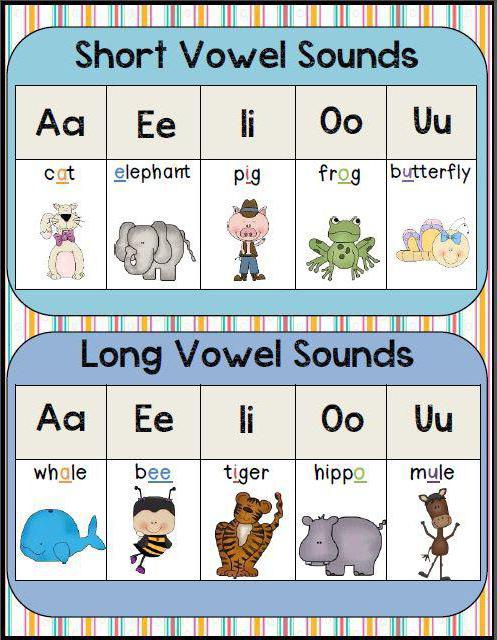Establishing correct pronunciation can be one of the most complex tasks in the process of learning English. This is due to the fact that ours is not adapted to the characteristic sounds and intonation of foreign speech. You have to readjust, and this requires effort, constant practice and correction of results. Correct pronunciation words in English can be learned through knowledge of basic terms, work on phonetics and by imitating the pronunciation of native speakers when speaking. Individual sounds, intonation and accent placement are the three main stages of training. Correct pronunciation will no longer be an unattainable task when the puzzle of how to achieve the desired result “fits” in your head.
Components of working on pronunciation skills
When starting to learn English, from the very first lessons you should pay attention to the correct pronunciation of characteristic sounds. At the same time, you should not be afraid of mistakes. They will certainly be there, so it is better to concentrate on the desire to speak and remove the psychological barrier. Often it is due to the fact that from the outside you hear yourself “in a new way”, not in the same way as usual. This is what prevents you from freely pronouncing sounds and words unusual for Russian, and preserves the intonation of your native speech.
When starting to learn a new language, people are faced with the need to learn to read. To do this, letters and sounds are studied. The first pronunciation lessons begin with them. Then comes the stage of words, reading syllables, placing stress. When working on reading sentences, it is very important to work on intonation, imitating the speech of native speakers. Without this, the meaning of some statements may be misunderstood by the interlocutor. Correct words, especially unfamiliar ones, should definitely be checked in an audio dictionary or by checking with the transcription. This will avoid incorrect memorization and additional correction work in the future.

Transcription
One of the main and most common ways to find out the correct pronunciation of a word in foreign language is reading from transcription. This is an alphabetic code adopted by international standards. It will allow you to find out how a word is read and pronounced without being able to hear it from the outside. It’s worth learning from the very first lessons in order to intensify the process of expanding your vocabulary, remove the fear of unfamiliar vocabulary, and also have the opportunity to work on pronunciation. You can figure it out either on your own or with the help of a Russian-speaking teacher. Correct pronunciation of words in English should be one of the priorities in the learning process, since it is this that guarantees comfortable and effective communication in the future, as well as understanding of what you say by native speakers. Transcription will make any unfamiliar word accessible to study and recognizable in speech.
Effective techniques for working on pronunciation
There are several simple and effective methods, which can be used both independently and in classes with a teacher to get the correct pronunciation. They come down to reading aloud, listening with pronunciation, phonetic exercises for producing specific sounds and types of intonation, as well as working with tongue twisters.
Correct pronunciation of words largely depends on training and the correct “basic position” of the speech apparatus. If it’s difficult to figure it out on your own, it’s better to contact a teacher. Some recommend that beginners hold a pencil between their teeth and read individual words with it, moving on to sentences and texts as they increase their vocabulary.

Work on mistakes
It is important to receive feedback for correction already in the first stages of developing pronunciation skills possible errors. To do this, you can resort to the help of a teacher, make a friend in a language social resource and ask him for help with difficult words, record yourself while reading and listen, comparing with the speech of native speakers. Correct pronunciation of English words is a realistically achievable task with the right approach to the process of elaboration and systematic practice. Pay attention to which sounds are most difficult for you, and find additional reading and phonics exercises that will allow you to achieve good results. Constantly monitor your progress with audio recordings. Correct pronunciation should be worked on, starting with slow speech, only then approaching the pace of real everyday communication.
Useful resources
While working on your pronunciation skill, it is important to constantly receive feedback and compare yourself with the original. Even if you can’t ask for advice, you can turn to online audio dictionaries for help, listen necessary word in Google Translator, visit a special resource where you can check your pronunciation. A word or sentence is read, and then it is played back in the original to compare the two options and identify errors.
Videos, films, podcasts, where the audio track goes along with the text track, will also be useful resources; you can immediately note the pronunciation features of certain words, comparing them with the printed ones. This technique is especially good for visual learners. The correct pronunciation of words is remembered automatically, especially if the topic is close to your interests and emotions.

Practice, practice and more practice, together with theoretical knowledge, will give inspiring results after just a week of classes. Tongue twisters, phonetic exercises, reading aloud, correcting errors by checking audio recordings of your speech will provide the opportunity to correctly pronounce and instill confidence in your skills when communicating with native speakers. Don't be afraid of mistakes, they are just stages on the way to ideal results.
Many of us are sure that learning English is too difficult. And in order to learn the correct pronunciation, you will certainly have to shell out a considerable amount. Using the following rules, you can easily master the correct pronunciation at home.
What is transcription
Most words in English are pronounced according to general rules, although there are, of course, exceptions. How to pronounce english words? The main assistant in this is transcription. Phonetic transcription is a graphic recording of the sounds of an English word. It was precisely invented to accurately describe pronunciation. Each sound in a word must be recorded in the recording with a special icon.
Consonants
| Letter English alphabet and the corresponding sounds of the Russian language | Transcription |
| B is read as sound [b] | [b] |
| C is read as sound 1. [c] before the vowels e, y, i; 2. [k] | 1. [s] only before vowels y, e, i; 2. [k] in other cases |
| D is read as sound [d] | [d] |
| F is read as sound [f] | [f] |
| G is read as sound [j] | 1. if followed by i, e, y; 2. [g] in other cases (except give, get) |
| H is read as the sound [x] | [h] |
| J is read as sound [j] | |
| K, ck is read as the sound [k] | [k] |
| L is read as sound [l] | [l] |
| M is read as sound [m] | [m] |
| P is read as sound [p] | [p] |
| Q+u, read as sounds [kv] | |
| R is read as sound [р] | [r] will only be pronounced before a vowel |
| S is read as sounds 1.[z] 2.[s] | 1.[z] if located between two vowels, at the end of a word it follows a voiced consonant or vowel; 2.[s] in other cases |
| T is read as sound [t] | [t] |
| V is read as sound [v] | [v] |
| W (there is no such sound in Russian) | [w] after a vowel and before r - not pronounced |
| X is read as sound [ks] | 1. 2. if it is between vowels |
It is necessary to dwell separately on reading letter combinations:
- ch, tch - read as
- th
- [t] in articles, pronouns (parts of speech of the English language), as well as between vowels;
- in all other cases.
- sh - the sound [?] is pronounced
It should also be noted that the consonants in English always pronounced firmly before any consonant, vowel, and at the end of words. During their pronunciation, the lips do not extend forward (as in the sound [w]), but are tense.
The pronunciation of voiceless consonants is aspirated.
Vowels
Vowels include triphthongs and diphthongs. These are vowels, at the moment of pronunciation of which the speech organs change their position towards the end of the sound. English vowels also differ in length of pronunciation. A long sound in transcription is indicated by the sign [:]. For example, [i] – . The reading of vowels will depend on the type of syllable they are in and the stress. There are four types of syllables in English words:
Open syllable
The first type is called an open syllable, it differs in that it ends with a consonant. It is easy to remember that in an open syllable the vowel will be read the same way as it sounds in the alphabet:
| Letter | Examples | Sound |
| A | name, face, | |
| e | met, he, | |
| i(y) | type, Time | |
| o | no, note, go | |
| U | tulip, mute, cube, |
Closed syllable
The second type of syllable is a closed syllable. The word in this case ends with a consonant. In this case, the root vowel will be read briefly.
| Letter | Examples | Sound |
| a | вag, man, back | [?] |
| e | pencil, pen, | [e] |
| i(y) | middle, kitten. | [i] |
| o | bottle, hot. | |
| u | nut,butter | [?] |
Third syllable type
Third syllable type if the root vowel comes immediately before the "r". In this case, the vowels (e, u,y, i) will give the sound [?:], o – [?:], a – , when reading.
Fourth syllable type
The fourth type of syllable, if the root vowel comes before “re”:
| Letter | Examples | Sound |
| a | Care, spare | [??] |
| e | Here | |
| i(y) | Fire | |
| o | sore | [?:] |
| u | Cure, pure |
Attention, remember that unstressed vowels are mostly read as weakened or neutral sounds [?] and [i], without taking into account the rules for reading stressed vowels. Common mistake for Russian-speaking students is the clear pronunciation of unstressed vowels. There are cases, of course, when an unstressed vowel should not be weakened, for example, if it is followed by one consonant: July, instrument. In this case, unstressed vowels should be pronounced less slowly and less intensely than stressed ones.
Vowel combinations
One more rule. The English language has digraphs, that is, combinations of two letters. As a rule, in this case the first letter of the digraph will be read, but the second will not be read at all: meet, sea, May, boat, faint. Here are some more rules regarding the combination of letters:
| Letter | combinations | example |
| Aa [?:] | 1. ar, ass, ans, ast, ant, alf, anch, ask, ance, ath, aft 2. Before l or l+ consonant ught, an, aw after w, wh |
part, class, mast, grant, branch, ask, half, father, chance, after. small [smo:l],tall [to:l]; bald [bo:ld], talk [to:k] /td> |
| Her , | 1.ear, eer, ere 2. ew, eu hear, engineer, here. |
few, Europe. |
| Oo, [?:], [u] | 1. ow, ou 2. oor, ore, oar, ought 3. oo town, house, round |
forty, sport, more, door, board, brought. book, food |
| Ii, Yy, |
1. In an open stressed syllable before ld, nd, gh, gn 2. Combined in the middle of words ie |
sight, sign, child, find, |
Sound of transcriptions different letters and their combinations can be listened to by going here.
Remember that for every rule there are exceptions, so it would be good to know the transcription. If you don’t know how to pronounce English words, in difficult cases, you can always look it up in the dictionary. Or, if you have the opportunity, you can listen to how to pronounce English words online, for example, using this English video dictionary.
Using these tables, and using modern technologies, understanding how to pronounce English words correctly is not that difficult. Of course, it is impossible to cover all the subtleties of pronunciation in the space of one article. But those who have a strong desire to master the language will not stop there and will continue to study English.
Now on clear example we'll try to understand how guessing the pronunciation of a word can hurt you.
Let's say you want to read the word determine. Only you don't know how to pronounce it, so you try to guess - dee-tur-mine (with an emphasis on mine). It's wrong (you need to say it), but without even knowing it, you repeat the word over and over again until you get used to it. And it turns out that you remembered the incorrect pronunciation of the word.
Precisely because English pronunciation unpredictable trying to guess is a bad idea. It often leads to mistakes, which, in turn, reinforce incorrect pronunciation. When you guess, you train yourself to pronounce thousands of words incorrectly. And even if you later learn how the word is actually read, it will be difficult for you to forget the incorrect version, since you have already repeated it so many times.
You might think that even if you make a mistake, someone will definitely correct your pronunciation and you won't make the same mistakes again. But in reality, you can't count on it. To correct someone's mistakes, you need not only to know English perfectly, but also to have the time and energy to do it. Sometimes it is very difficult to find someone who would be willing to correct all your mistakes, whether they are in speech or writing. You also make mistakes in pronunciation not only when you speak, but also when you are engaged in other activities.
Reading aloud, is probably the worst thing to do in this case. When you read a text out loud and are faced with a difficult word, you probably don't think much about how to pronounce it correctly, and thus you remember the words incorrectly. “Ordinary” reading is no less dangerous. When you say sentences in your head, you can also make pronunciation mistakes. Therefore, ideally, you would be better off learning the rules of reading first before you start reading in English.
Avoid remembering incorrect pronunciations
The longer you ignore reading rules, the more incorrectly pronounced words you remember. Therefore, the solution is quite obvious: learn to pronounce English words correctly as early as possible.
How to learn to read English words

Remember the words correctly
It will take several months or years for your brain to get used to the new sounds. In the beginning, you may not be able to pronounce the [r] sound perfectly or tell the difference between (where) and [ɜː] (were). But even in this case, you need to try to pronounce English words correctly. Otherwise, it will be difficult for people to understand you.

How to remember the pronunciation correctly? When you read an English word, you should know exactly what its transcription looks like, that is, what sounds you are trying to pronounce, even if you are not yet able to do it perfectly.
For example, when you say full, you should know that you are trying to make the same [ʊ] sound as in put or could, and you should know that the words rude or school have different sounds, but the [ʊ] sound in should is not the same like (rude), even if they sound the same.
Why is it more important to remember a word correctly than to learn to pronounce it correctly? There are 44 sounds in the English language: even if you mispronounce each one, that's only 44 mistakes. Fixing 44 errors is a problem, but it is not that big. Over time, you will learn to pronounce words correctly and your pronunciation will improve.
The situation is much worse when you don't know how English words are supposed to be pronounced, for example you mistakenly think that in the word museum the stress falls on the first syllable (MUseum instead of muSEum) or desperate rhymes with rate. In such a case, you must fight hundred mistakes in your pronunciation. And it will take you a lot of time.
Therefore, your first goal in learning a language should be to learn the correct pronunciation of words. First, learn to recognize all English sounds. Secondly, determine which sounds occur in which words, even if you yourself cannot reproduce them. Only when you consolidate this knowledge will you be able to correctly pronounce all the sounds of the English language.
Sounds of the English language and their transcription
Vowel sounds:
| Sound | Pronunciation | Example |
|---|---|---|
| Corresponds to long sound A | Last Listen |
|
| [æ] | Average sound between A And uh | Ally [‘ æ
lai] Listen |
| Reminds me of a lingering sound And | Key Listen |
|
| [i] | Reminds me of a short sound And | Bullet ['bul i t] Listen |
| [e] | Reminds me of sound uh | Blame Listen |
| [ɔ] | Brief sound O | Pot Listen |
| [ɔ:] | Reminds me of a lingering sound O | Torment[‘t ɔ:
ment] Listen |
| [ə:] | Average sound between O And uh, reminds e | - |
| [ə] | Vague, unaccented sound, similar to uh | Pole Listen |
| [ʌ] | Reminds me of sound A | Funny ['f ʌ
ni] Listen |
| [h] | Reminds me of sound e | Girl Listen |
| [u] | Brief sound at | Cook Listen |
| Reminds me of a lingering sound at | School Listen |
|
| Reminds me of sound ah | Slide Listen |
|
| Reminds me of sound Hey | Sale Listen |
|
| [ɔi] | Reminds me of sound Ouch | Toy Listen |
| Reminds me of sound aw | Now Listen |
|
| [əu] | Reminds me of sound oh | So Listen |
| Reminds me of sound ie | Wire[‘wa iə]
Listen |
|
| Reminds me of sound uh | Tower[‘ta uə] | |
| [ɛə] | Vaguely resembles the sound ea | Dare Listen |
Consonants:
|
Designation |
Pronunciation |
Example |
| [l] | Corresponds to Russian sound l | Lab [ læb] |
| [p] | Corresponds to Russian sound n | Sleep |
| [b] | Corresponds to Russian sound b | Bush[ b uʃ] |
| [t] | Corresponds to Russian sound T | Point |
| [d] | Corresponds to Russian sound d | Drama [‘ d ra:mə] |
| [m] | Corresponds to Russian sound m | Time |
| [k] | Corresponds to Russian sound To | Kiss [ k is] |
| [g] | Corresponds to Russian sound G | Goal [ gəul] |
| [n] | Corresponds to Russian sound n | Snake |
| [ʃ] | Corresponds to Russian sound w | Motion [‘məu ʃ (ə)n] |
| [f] | Corresponds to Russian sound f | Office [‘ɔ f is] |
| [v] | Corresponds to Russian sound V | Nerve |
| [s] | Corresponds to Russian sound With | Peace |
| [z] | Corresponds to Russian sound h | Museum |
| [ʒ] | Corresponds to Russian sound and | Joy |
| Corresponds to Russian sound h | Inch | |
| Corresponds to Russian sound j | Joke[ dʒəuk] | |
| [r] | Reminds me of sound r | Red [ r ed] |
| [h] | Reminds me of sound X | Hammer [‘ hæmə] |
| [j] | Reminds me of sound th | - |
| Reminds me of sound yu | View [‘v ju:] | |
| Reminds me of sound e | Yellow [‘ je ləu] | |
| Reminds me of sound e | Year[ jз:] | |
| Reminds me of sound I | Young [ jʌŋ] | |
| [w] | Sound at or V | Water [‘ wɔ:tə] |
| [ŋ] | Vaguely resembles the sound n | King |
| [θ] | Average sound between With And f | Thin[ θ in] |
| [ð] | Average sound between h And V | Brother |
Now for some practice:
| disadvantageous | [ˌdɪsædvənˈteɪdʒəs] |
| incomprehensible | [ɪnˈkɒmprɪˈhɛn(t)səbl] |
| Refrigerator | |
| differentiate | [ˌdɪf(ə)ˈrɛn(t)ʃɪeɪt] |
| successfully | |
| unfortunately | [ʌnˈfɔːtʃ(ə)nətlɪ] |
| revolutionary | [ˌrɛv(ə)ˈluːʃ(ə)n(ə)rɪ] |
| technological | [ˌtɛknəˈlɒdʒɪk((ə)l)] |
| circumstance | [ˈsɜːkəmstæn(t)s] |
| indestructible | [ˌɪndɪˈstrʌktəbl] |
| synchronization | [ˌsɪŋkrənaɪˈzeɪʃ(ə)n] |
| archeological | [ˌɑːkɪəˈlɒdʒɪk(ə)l] |
| indistinguishable | [ˌɪndɪˈstɪŋɡwɪʃəbl] |
| characteristically | [ˌkærəktəˈrɪstɪk(ə)lɪ] |
| familiarity |
Transcription English letters- this is where learning English begins. It doesn’t matter at all whether you are elementary or upper-intermediate, everyone uses transcription, sometimes even unconsciously. First, let's refresh our memory, what does the phrase “English transcription” mean?
English Transcription is a sequence of phonetic symbols that helps us understand how to read a particular sound or word. Often, students are faced with transcription at the beginning of learning a language, when it is still quite difficult to read even quite simple words, and then they simply don’t pay attention to it. However, this will not be the case forever. As soon as a student begins to skillfully use complex grammatical structures and develops a good vocabulary for free communication, then the desire immediately appears to speak beautifully, like a native speaker, that is, to improve your pronunciation. This is where we remember the good old transcription.
In order not to have to remember the well-forgotten old things, we suggest returning to the repetition from time to time. Of course, ideally, the transcription should be completed together with the teacher, because writing cannot convey all the subtleties of pronunciation, but if you are reading this article now, the foundation for beautiful pronunciation and correct reading has already been laid, and you will definitely achieve your desired goal.
Transcription of vowel sounds
There are two types of vowel sounds - single sounds and diphthongs.
[ ʌ ] - [a] - short
[a:]- [a] - deep
[i]- [and] - short
[i:]- [and] - long
[o]- [o] - short
[o:]- [o] - deep
[u]- [y] - short
[u:]- [y] - long
[e]- as in the word "plaid"
[ ɜ: ] - as in the word "honey"
English diphthongs
A diphthong is a sound that consists of two sounds. Most often, a diphthong can be divided into two sounds, however, this cannot be conveyed in writing. Often diphthongs are indicated not by a combination of several characters, but by their own sign.
[əu]- [oh]
[au]- [au]
[ei]- [ Hey ]
[oi]- [ Ouch ]
[ai]- [ouch]

Rules for pronunciation of vowels in English
- The sound “a” has four varieties:
[ʌ] - short sound, as in the words duck, cut;
[ æ ] - soft sound. There is no analogue to it in the Russian language. It is read as in the word in the word cat;
[a:] - a long sound that is read as in the word car
[ɔ] is a short sound that sounds similar to both “o” and “a”. In British pronunciation, it is more of an "o", as in hot or not. - The sound “e” can be read in three ways:
[e] - for example, as in the word let;
[ə:] - this sound is a little reminiscent of the Russian letter “ё”, only it is read a little softer. For example, bird, fur;
[ə] is one of the most common sounds in English transcription. In sound, this sound is similar to the Russian sound “e”. It occurs only in unstressed syllables and can be practically inaudible or indistinguishable, for example, ["letə], letter - letter. - The “i” sound can be long or short:
[I] - short sound, for example, as in the word film;
[i:] - a long sound, for example, as in sheep. - The sound “o” also has 2 options - long and short:
[ɔ] is a short sound, as in the word bond.
[ɔ:] is a long sound, as in the word more. - The "u" sound can also be pronounced in two ways. It can be long or short:
[u] is a short sound, as in the word put.
[u:] - long sound, as in the word blue.
Transcription of consonants
In the transcription of consonant sounds, everything is quite simple. Basically they sound similar to Russian. It is enough to take a thoughtful look at the above-mentioned letter combinations a couple of times, and they will remain in your memory.
Consonants
[b]- [b]
[d]- [d]
[f]- [f]
[ 3 ] - [ and ]
[d3]- [j]
[g]- [ G ]
[h]- [ X ]
[k]- [ To ]
[l]- [l]
[m]- [m]
[n]- [n]
[p]- [n]
[s]- [ With ]
[t]- [ T ]
[v]- [ V ]
[z]- [z]
[t∫]- [h]
[ ∫ ] - [w]
[r]- soft [r], as in the word Russian
[ O ]- a sign of softness as in the Russian letter “ё” (Christmas tree)
English consonants that are not in Russian and their pronunciation
[ θ ] - soft letter“c”, the tongue is located between the front teeth of the upper and lower jaws
[ æ ] - like “uh”, only more sharply
[ ð ] - like “θ”, only with added voice, like a soft letter “z”
[ ŋ ] - nasal, in the French manner, sound [n]
[ ə ] - neutral sound
[w] - like “v” and “u” together, soft pronunciation

Features of English transcription
In order to make it easier to navigate reading words, it is important to know the main features of transcription:
- Feature 1. Transcription is always formatted in square brackets
- Feature 2. In order not to get confused about where to place the stress in a word, it is worth considering that it is always placed before the stressed syllable. ["neim] - transcription of the word name.
- Feature 3. It is important to understand that transcription is not the letters that make up a word. Transcription is the sound of words.
- Feature 4. In English, transcription consists of vowel sounds, diphthongs and consonants.
- Feature 5. In order to show that the sound is long, a colon is used in transcription.
Of course, knowing only character sets, it is quite difficult to read everything correctly, because there are many exceptions. In order to read correctly, you need to understand that there are closed and open syllables. An open syllable ends with a vowel (game, sunshine), a closed syllable ends with a consonant (ball, dog). Some sounds may be pronounced differently depending on the type of syllable.
Conclusion
It is worth remembering that in any business the main thing is practice. Transcription English sounds will come easy to you if you work hard at it. Reading the rules once is not enough. It is important to return to them, work through them and repeat them regularly until they are practiced to the point of automaticity. Dictionaries will greatly help you remember transcriptions and correct pronunciation of words. You can use both English online dictionaries and good old printed publications. The main thing is not to give up!
Inspiration to you and success in your studies. May the knowledge be with you!
Big and friendly family EnglishDom



